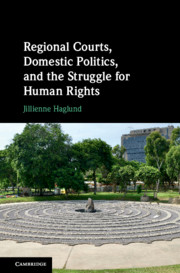Book contents
- Frontmatter
- Dedication
- Contents
- List of Figures
- List of Tables
- Acknowledgements
- 1 Introduction
- 2 Explaining Regional Human Rights Court Deterrence
- 3 Examining Patterns of General Regional Court Deterrence
- 4 Does the Executive have the Capacity to Respond to Adverse Judgments?
- 5 Is the Executive Willing to Respond to Adverse Judgments? The Role of Mass Public Pressure
- 6 Is the Executive Willing to Respond to Adverse Judgments? The Role of Elite Pressure
- 7 Amplified Regional Court Deterrence: High Executive Capacity and High Executive Willingness
- 8 Conclusion
- Appendix A Chapter 3 Appendix
- Appendix B Chapter 4 Appendix
- Appendix C Chapter 5 Appendix
- Appendix D Chapter 6 Appendix
- Appendix E Chapter 7 Appendix
- References
- Index
4 - Does the Executive have the Capacity to Respond to Adverse Judgments?
Published online by Cambridge University Press: 01 June 2020
- Frontmatter
- Dedication
- Contents
- List of Figures
- List of Tables
- Acknowledgements
- 1 Introduction
- 2 Explaining Regional Human Rights Court Deterrence
- 3 Examining Patterns of General Regional Court Deterrence
- 4 Does the Executive have the Capacity to Respond to Adverse Judgments?
- 5 Is the Executive Willing to Respond to Adverse Judgments? The Role of Mass Public Pressure
- 6 Is the Executive Willing to Respond to Adverse Judgments? The Role of Elite Pressure
- 7 Amplified Regional Court Deterrence: High Executive Capacity and High Executive Willingness
- 8 Conclusion
- Appendix A Chapter 3 Appendix
- Appendix B Chapter 4 Appendix
- Appendix C Chapter 5 Appendix
- Appendix D Chapter 6 Appendix
- Appendix E Chapter 7 Appendix
- References
- Index
Summary
This chapter empirically examines the conditions under which the executive has the capacity to respond to adverse judgments with human rights policy change. I argue that the executivehas greater capacity to adopt, administer, monitor, and enforce human rights policy when policy change is more feasible. Specifically, civil and political rights improvements are more directly within the executive's control than are physical integrity rights improvements. I show that civil and political rights judgments are more strongly associated with human rights gains than physical integrity rights judgments in Europe and the Americas. Beyond the feasibility of policy change, I also argue that the executive has greater capacity to respond to adverse judgments with policy change when the state has access to outside resources. I show that adverse judgments are positively related to respect for rights as the state's creditworthiness (institutional investor credit rating) increases.
Keywords
- Type
- Chapter
- Information
- Publisher: Cambridge University PressPrint publication year: 2020

